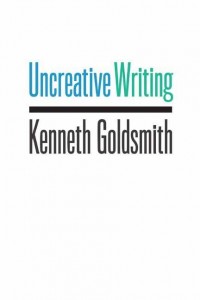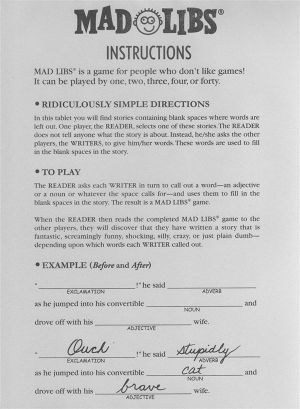Templates: Difference between revisions
Andre Castro (talk | contribs) No edit summary |
Andre Castro (talk | contribs) |
||
| (19 intermediate revisions by the same user not shown) | |||
| Line 1: | Line 1: | ||
= Git of the day= | |||
git clone https://git.pzimediadesign.nl/repos/t4pp_03_templates.git | |||
= template based works = | = template based works = | ||
[[File:Madlibs02.jpg|right|300px]] | [[File:Madlibs02.jpg|right|300px]] | ||
| Line 4: | Line 8: | ||
[https://en.wikipedia.org/wiki/Mad_Libs Mad Libs] - phrasal template word game | [https://en.wikipedia.org/wiki/Mad_Libs Mad Libs] - phrasal template word game | ||
Artybollocks Generator | Artybollocks Generator | ||
| Line 12: | Line 14: | ||
Spam | Spam | ||
* [https://pinknoi.so/2013-Works-NarrativesofDeception.html ''Narratives of Deception''] - [https://wiki.pinknoi.so/images/pdf/Narratives_booklet.pdf PDF booklet] | * [https://pinknoi.so/2013-Works-NarrativesofDeception.html ''Narratives of Deception''] - [https://wiki.pinknoi.so/images/pdf/Narratives_booklet.pdf PDF booklet] | ||
News and reports | |||
* [https://www.wired.com/2015/10/this-news-writing-bot-is-now-free-for-everyone This News-Writing Bot Is Now Free for Everyone] ''Wired'' | |||
=Cut ups= | |||
<blockquote> | |||
Take a newspaper. | |||
Take some scissors. | |||
Choose from this paper an article the length you want | |||
to make your poem. | |||
Cut out the article. | |||
Next carefully cut out each of the words that make up | |||
this article and put them all in a bag. | |||
Shake gently. | |||
Next take out each cutting one after the other. | |||
Copy conscientiously in the order in which they left the | |||
bag. | |||
The poem will resemble you. | |||
And there you are—an infinitely original author of | |||
charming sensibility, even though unappreciated by the | |||
vulgar herd. | |||
</blockquote> | |||
* cut out each of the words that make up this article | |||
* Shake gently | |||
* take out each cutting one after the other | |||
''Words Made Flesh'' Florian Cramer - Chapter 3: Computation and Fragmentation | ''Words Made Flesh'' Florian Cramer - Chapter 3: Computation and Fragmentation | ||
= Markov Chains= | = Markov Chains= | ||
* [http://setosa.io/ev/markov-chains/ Markov Chains] are random generators with memory | |||
* Markov Chains analyze the transitions of an event (eg: the sequence of words in a text or the sequence of rainy and sunny days in weather), resulting in its transition tables | |||
* the transition tables of a text can be used to generate new texts | |||
* the generated sentences will tend to be grammatically correct, but semantically random (despite lacking natural language knowledge) | |||
* more input <nowiki>==</nowiki> more complex results | |||
== | ==text generation programs using Markov chains== | ||
* [https://www.jwz.org/dadadodo/ dadadodo] | |||
== python install PyMarkovChain == | == python install PyMarkovChain == | ||
| Line 35: | Line 62: | ||
* (debian/ubuntu) <pre>sudo aptitude install python-pip</pre> | * (debian/ubuntu) <pre>sudo aptitude install python-pip</pre> | ||
* (mac) <pre>brew install python-pip</pre> | * (mac) <pre>brew install python-pip</pre> | ||
=Uncreative Writing - Kenneth Goldsmith= | |||
http://htmlgiant.com/wp-content/uploads/2013/02/Uncreative-Writing-Goldsmith-Kenneth-EB2370004184746-e1360045972335.jpg | |||
* List of Goldsmith works: https://monoskop.org/Kenneth_Goldsmith | |||
* Book: ''Uncreative Writing'' https://monoskop.org/log/?p=10009 | |||
* Documentary: ''Sucking on Words'' http://www.ubu.com/film/goldsmith_sucking.html | |||
<blockquote>faced with an unprecedented amount of available text, the problem is not needing to write more of it; instead, we must learn to negotiate the vast quantity that exists. How I make my way through this thicket of information—how I manage it, how I parse it, how I organize and distribute it—is what distinguishes my writing from yours.</blockquote> | |||
<blockquote>Far from this “uncreative” literature being a nihilistic, begrudging acceptance—or even an outright rejection—of a presumed “technological enslavement,” it is a writing imbued with celebration […] The wonderful rhythms of repetition, the spectacle of the mundane reframed as literature, a reorientation to the poetics of time, and fresh perspectives on readerliness</blockquote> | |||
'''Goldsmith, Kenneth. 2011. Uncreative Writing: Managing Language in the Digital Age. New York: Columbia University Press.''' | |||
Uncreative writing practices also provide a windows to ''the ways in which we write and are written in the current technological context''. Examples of works that explore this aspect: | |||
* James Bridel [http://p-dpa.net/work/iraq-war-wikihistoriography/ The Iraq War: A History of Wikipedia Changelogs] | |||
* Traumawien [http://traumawien.at/prints/american-psycho/ American Psycho] [http://traumawien.at/prints/american-psycho/american_psycho_content.pdf PDF] | |||
* [http://p-dpa.net/printing-wikipedia-a-chronology/ More experimental publishing projects on Wikipedia] (courtesy of P-DPA) | |||
=Filter Bubble= | |||
<img width="400px" src="http://www.tracyparish.ca/wp-content/uploads/2013/10/image3.jpg"/><br/>Image source:http://www.tracyparish.ca/2013/10/the-filter-bubble-eli-pariser-devlearn-sketchnote.html | |||
<blockquote>The 2016 election took place under the spectre of a bubble. Not the subprime mortgage lending bubble that shaped the 2008 election, but the “filter bubble”. Tens of millions of American voters gets their news on Facebook, where highly personalized news feeds dish up a steady stream of content that reinforces users’ pre-existing beliefs. | |||
</blockquote>''' | |||
Wong, Julia Carrie, Sam Levin, and Olivia Solon. 2016. “Bursting the Facebook Bubble: We Asked Voters on the Left and Right to Swap Feeds.” The Guardian, November 16, sec. US news. https://www.theguardian.com/us-news/2016/nov/16/facebook-bias-bubble-us-election-conservative-liberal-news-feed. | |||
''' | |||
<blockquote>Democracy requires citizens to see things from one another’s point of view, but instead we’re more and more enclosed in our own bubbles. Democracy requires a reliance on shared facts; instead we’re being offered parallel but separate universes. | |||
</blockquote> | |||
<blockquote>As Chris Palmer of the Electronic Frontier Foundation explained to me, “You’re getting a free service, and the cost is information about you. And Google and Facebook translate that pretty directly into money.”</blockquote> | |||
'''Pariser, Eli. 2011. The Filter Bubble: What the Internet Is Hiding From You. London: The Penguin Press. | |||
''' | |||
<img src="http://pzwiki.wdka.nl/mw-mediadesign/images/b/b6/Filterbubble-writing.svg" width="300px"/> | |||
'''How Technology Disrupted the Truth – Podcast | News | The Guardian. 2016. Accessed November 21. https://www.theguardian.com/news/audio/2016/jul/22/how-technology-disrupted-the-truth-podcast. | |||
''' | |||
= Integration with HTML,CSS= | = Integration with HTML,CSS= | ||
| Line 40: | Line 110: | ||
* CSS can provide (variable) style | * CSS can provide (variable) style | ||
* WeasyPrint can generate PDFs and PNGS from HTML and CSS, and can be use as a Python library | * WeasyPrint can generate PDFs and PNGS from HTML and CSS, and can be use as a Python library | ||
=cronjob= | |||
crontab -e | |||
Latest revision as of 09:22, 24 November 2016
Git of the day
git clone https://git.pzimediadesign.nl/repos/t4pp_03_templates.git
template based works
Mad Libs - phrasal template word game
Artybollocks Generator
Spam
News and reports
Cut ups
Take a newspaper. Take some scissors. Choose from this paper an article the length you want to make your poem. Cut out the article. Next carefully cut out each of the words that make up this article and put them all in a bag. Shake gently. Next take out each cutting one after the other. Copy conscientiously in the order in which they left the bag. The poem will resemble you. And there you are—an infinitely original author of charming sensibility, even though unappreciated by the vulgar herd.
- cut out each of the words that make up this article
- Shake gently
- take out each cutting one after the other
Words Made Flesh Florian Cramer - Chapter 3: Computation and Fragmentation
Markov Chains
- Markov Chains are random generators with memory
- Markov Chains analyze the transitions of an event (eg: the sequence of words in a text or the sequence of rainy and sunny days in weather), resulting in its transition tables
- the transition tables of a text can be used to generate new texts
- the generated sentences will tend to be grammatically correct, but semantically random (despite lacking natural language knowledge)
- more input == more complex results
text generation programs using Markov chains
python install PyMarkovChain
install PyMarkovChain Python library
sudo pip install PyMarkovChain
if you dont have pip (python package manager) install it:
- (debian/ubuntu)
sudo aptitude install python-pip
- (mac)
brew install python-pip
Uncreative Writing - Kenneth Goldsmith

- List of Goldsmith works: https://monoskop.org/Kenneth_Goldsmith
- Book: Uncreative Writing https://monoskop.org/log/?p=10009
- Documentary: Sucking on Words http://www.ubu.com/film/goldsmith_sucking.html
faced with an unprecedented amount of available text, the problem is not needing to write more of it; instead, we must learn to negotiate the vast quantity that exists. How I make my way through this thicket of information—how I manage it, how I parse it, how I organize and distribute it—is what distinguishes my writing from yours.
Far from this “uncreative” literature being a nihilistic, begrudging acceptance—or even an outright rejection—of a presumed “technological enslavement,” it is a writing imbued with celebration […] The wonderful rhythms of repetition, the spectacle of the mundane reframed as literature, a reorientation to the poetics of time, and fresh perspectives on readerliness
Goldsmith, Kenneth. 2011. Uncreative Writing: Managing Language in the Digital Age. New York: Columbia University Press.
Uncreative writing practices also provide a windows to the ways in which we write and are written in the current technological context. Examples of works that explore this aspect:
- James Bridel The Iraq War: A History of Wikipedia Changelogs
- Traumawien American Psycho PDF
- More experimental publishing projects on Wikipedia (courtesy of P-DPA)
Filter Bubble

Image source:http://www.tracyparish.ca/2013/10/the-filter-bubble-eli-pariser-devlearn-sketchnote.html
The 2016 election took place under the spectre of a bubble. Not the subprime mortgage lending bubble that shaped the 2008 election, but the “filter bubble”. Tens of millions of American voters gets their news on Facebook, where highly personalized news feeds dish up a steady stream of content that reinforces users’ pre-existing beliefs.
Wong, Julia Carrie, Sam Levin, and Olivia Solon. 2016. “Bursting the Facebook Bubble: We Asked Voters on the Left and Right to Swap Feeds.” The Guardian, November 16, sec. US news. https://www.theguardian.com/us-news/2016/nov/16/facebook-bias-bubble-us-election-conservative-liberal-news-feed.
Democracy requires citizens to see things from one another’s point of view, but instead we’re more and more enclosed in our own bubbles. Democracy requires a reliance on shared facts; instead we’re being offered parallel but separate universes.
As Chris Palmer of the Electronic Frontier Foundation explained to me, “You’re getting a free service, and the cost is information about you. And Google and Facebook translate that pretty directly into money.”
Pariser, Eli. 2011. The Filter Bubble: What the Internet Is Hiding From You. London: The Penguin Press.

How Technology Disrupted the Truth – Podcast | News | The Guardian. 2016. Accessed November 21. https://www.theguardian.com/news/audio/2016/jul/22/how-technology-disrupted-the-truth-podcast.
Integration with HTML,CSS
- HTML can provide structure to templates
- CSS can provide (variable) style
- WeasyPrint can generate PDFs and PNGS from HTML and CSS, and can be use as a Python library
cronjob
crontab -e

